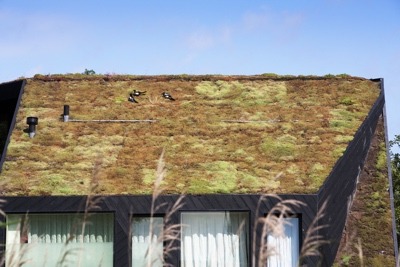
As land keeps on being replaced with impervious surfaces because of population growth and urbanization, the need to recover the green space has become increasingly critical for maintaining environmental quality. One of the many options for reducing the negative impact of the development would be green roof construction. Installing a green roof has a lot of economic, social, and environmental benefits. For this reason, here is your green roof guide.
Different types of green roofs
Usually, green roofs are internationally placed into three different categories. There are some cross overs between the categories but the three of them stand out because of their uniqueness and benefits. These are the three types of green roofs:
1. Extensive
These are designed specifically for environmental solutions. Some of its features are:
- low-maintenance ground-cover plants
- suitable for low-sloped retrofits and residential roofs
- after a year, these don’t require watering
- 3-6” of light-weight growing medium
- ideal for apartments and large flat-roof buildings
- annual spring wedding of weeds and tree seedlings – brought in by wind and birds
2. Intensive
These are better known as rooftop gardens. Some of their features include:
- diverse trees and plants can be planted easily
- requires regular maintenance
- 8-12” of growing medium
- a fully landscaped rooftop garden
- parks, vegetable gardens, playgrounds are possible
3. Semi-intensive
A semi-intensive green roof has elements of both intensive and extensive systems. The combination of both intensive and extensive green roofs are adopted typically to harness both the environmental benefits of the green roof as well as diverse gardens within a manageable budget.
Advertisement

How green roofs help with stormwater runoff?
One of the primary benefits of installing a green roof is helping you out with mitigation of stormwater runoff because of the prevalence of impervious surfaces in urban and sometimes in rural areas. Sometimes, rapid runoff from the roof surfaces might exacerbate flooding, cause an increase in erosion, or even result in raw sewage discharge into the rivers. If the amount of runoff is large, it will result in a larger quantity of water that needs to be treated before it becomes potable.
Green roofs have this ability to absorb stormwater and release it slowly over a given period of time. Having a decent green roof depth has shown that you can easily retain around 60-100% of the stormwater received. In addition, these also have longer lifespans than standard roofs as they have protection against ultraviolet radiation and extreme fluctuations of temperature that can cause the roof membranes to deteriorate.
Here’s another story you may like: 10 Features of Eco-friendly Homes
Benefits of green roof construction
Installing a green roof has a lot of benefits with very few negatives. Some of the benefits of green roofs include:
- Stormwater that leaves the roof is delayed and is reduced in terms of volume.
- Green roofs growing media can retain rainwater, and together with plants, return a fair portion of that water back to the atmosphere via evaporation and transpiration.
- The stormwater that runs off green roofs is much cleaner than the one that runs off from a conventional roof.
- Delay and retention of runoff ease the stress on stormwater infrastructure and sewers.
- The cost savings from decentralized stormwater mitigation can reduce the need of having to expand or renovate related infrastructure.
- Green roofs help save energy as they are energy efficient
- Green roofs can reduce the heat flux through the roof as you will require less energy for cooling your rooms leading to significant cost savings.
- Green roofs serve as a habitat for creatures seeking refuge. Rooftops are undisturbed areas so the creatures that are looking to survive can seek refuge here and use the roof for nesting and raising their young ones.
With this guide of green roofs and their benefits, you are now armed with information to help you in your quest to be eco-friendly in construction of your next home or addition to your current home. Eco-friendly homes are becoming more and more mainstream, and with it green roofs hope to play an important factor in staving off global warming.
You may also like our article about a vertical farming startup Nexton.






One Response